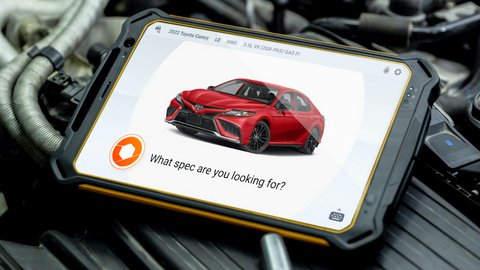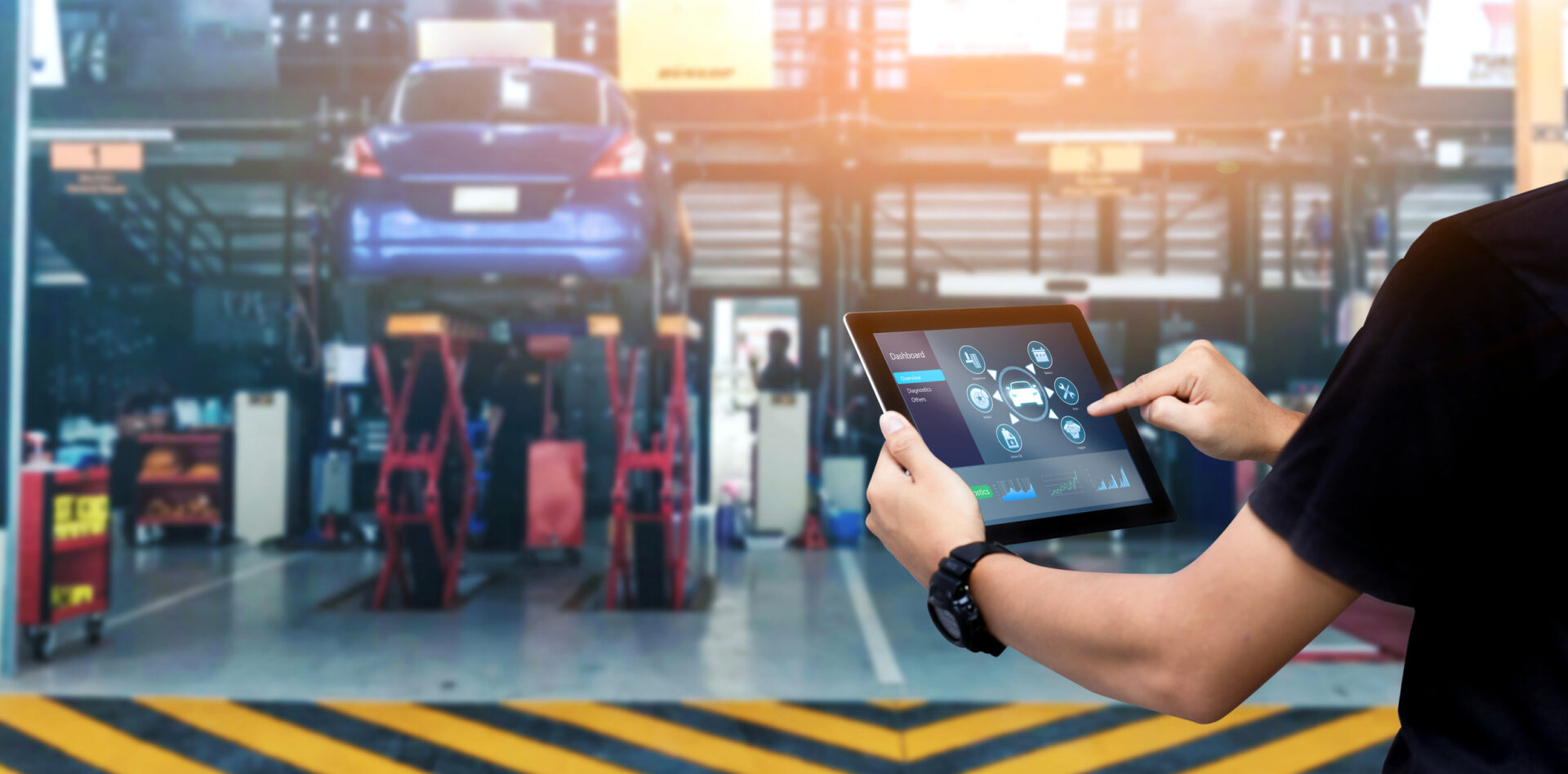Tech: AI in the Backshop
In the early 1980s, we were first introduced to KITT (short for “Knight Industries Two Thousand”), an artificially-intelligent persona living inside a 1982 Pontiac Trans Am on the iconic American TV Show Knight Rider. While KITT was outfitted with a dizzying array of sensors and weapons, its most powerful capability was being able to speak to humans. KITT was not just the trusty sidekick for David Hasselhoff, who played the series hero, but a vision of what’s possible at the intersection of the most advanced automotive and conversational AI technologies.

Some 30 years later, we are living in a time when these sci-fi visions are becoming reality as a result of rapid, converging technological advancements. Today’s cars are jam-packed with enough digital sensors and automation technology to make KITT jealous–and they now come with KITT-like voice assistants onboard. While today’s drivers are enjoying the benefits of these conversational super-computers-on-wheels, there’s another automotive segment that stands to benefit from voice and conversational AI technology: the aftermarket.
The aftermarket is simultaneously facing a trifecta of market dynamics: a massive shortage of talent (technician demand is outpacing supply by 5:1), a dramatic increase in demand (at 12.2 years, the average age of vehicles is at an all-time high), and a scramble to keep pace with OEM technologies, which can be highly variable across brands. The outcome? Aftermarket service centers have placed an even-greater emphasis on technician efficiency and productivity to meet demand. At the same time, they are looking for new ways to recruit and retain the next generation of auto service pros–digital natives who have come of age alongside Alexa and Siri.
Enter AI
Enter the vast potential of voice assistants–not just in the car, but in the shop garage. Technicians need quick and reliable access to accurate data about the cars they’re servicing, but retrieving this data can be anything but convenient. When you’re on the clock, wrenching under a vehicle and need to check a torque spec or a fluid type, the value of voice technology becomes dead-obvious. Sure, you could set your tools down, wash your hands, and walk to the computer terminal to type up a repair database search query, skim for your answer, then walk back to execute the job. Or, you could stay put, speak your question in natural language (three times faster than you can type) and immediately get just the data you need right there in the bay. Several minutes vs. several seconds. Compound that efficiency over each bay over the course of days and weeks, and you’ve got a force multiplier on shop throughput.

And that’s just the tip of the iceberg. As shops continue to digitize their operations through Shop Management Systems (SMS), they’re creating a treasure trove of data that can directly impact shop productivity. Voice interfaces can offer significant advantages when paired with these systems. For always-moving service advisors, how convenient would it be to get immediate answers to “what services did we recommend on Sally’s Jeep last visit?” or “what’s the ETA on the Integra’s filters?” In the bay, technicians could effortlessly clock in and out of jobs by voice, or dictate notes onto repair orders about an additional service a customer might want to consider. By lowering the barrier for SMS use and accelerating data access, information flows more freely to those who need it.
Voice assistants can also handle complex logic and provide proactive recommendations. Envision this: a technician or service advisor verbally logs a vehicle’s odometer at 48,856 miles, and in response, a voice assistant proactively details the recommended maintenance services for 50,000 miles. This allows a shop to easily propose those services to the customer during this visit.
Supercharging the Shop
Even digital vehicle inspections, which already eclipse clip-boards in terms of efficiency, could be supercharged with voice. No more fumbling through taps and menus while attempting to check out a vehicle. “Start the 20 point inspection…wipers are a little loose, log as yellow, snap a photo. OK, next step…” Now you’ve got more attention on the vehicle, less focus on the screen and its visual interface.
While the upside potential of voice in the garage is compelling, delivering on these voice assistant use cases is easier said than done. It demands a deep knowledge of the voice technical stack, from speech recognition in noisy environments to natural language understanding in the auto knowledge domain (e.g., to process a term like “wheel nut torque” as a common spec request and not have the system mis-hear it as “will not torque”).
When data becomes voice-activated – whether that data relates to vehicle repair guidelines, shop operations or troubleshooting the car in front of you–everyone benefits. Technicians and service advisors’ jobs become that much easier and more enjoyable. Shop owners attract and retain great talent. And customers get back on the road that much faster.
About Ortho
Ortho, the first-ever voice assistant for the automotive aftermarket, empowers auto service shops and professionals to work more efficiently and drive more revenue. Through a portable, hands-free solution, Ortho delivers accurate data on command, in seconds, right in the bay. From torque specs to fluid types, measurements to maintenance intervals, Ortho is the easiest and fastest way to access hundreds of data points for nearly every car on the road. Just say “Hey Ortho,” and go.
About RAIN Technology, Inc.
RAIN is a leader in voice technology and conversational AI. RAIN builds voice-first software products and supports the global industry leaders to integrate voice tech into their customer experience, operations and digital ecosystems. Backed by Stanley Ventures and other leading investment firms, RAIN is commercializing productivity-focused voice assistants to address major workplace inefficiencies. In addition to building its own products, RAIN continues to partner with industry-leading companies to develop bespoke voice products and experiences across the B2C, B2B and B2E landscape.

cheap generic lasuna – cheap diarex generic buy himcolin tablets
besivance over the counter – buy besifloxacin eye drops buy sildamax tablets
order neurontin 800mg without prescription – gabapentin tablet azulfidine 500 mg drug
buy probenecid 500mg online cheap – etodolac us tegretol 400mg over the counter
order celecoxib 100mg generic – cheap flavoxate pill buy indomethacin cheap
buy colospa pills – mebeverine for sale buy pletal 100 mg for sale
buy cheap generic diclofenac – diclofenac for sale order aspirin 75mg for sale
cheap rumalaya for sale – cheap generic rumalaya oral elavil 50mg
oral diclofenac – where can i buy nimodipine nimodipine online order
baclofen 10mg for sale – buy piroxicam 20mg generic piroxicam order online
order mobic 15mg generic – buy maxalt no prescription toradol oral
periactin over the counter – buy periactin without a prescription tizanidine 2mg canada
cheap trihexyphenidyl tablets – oral artane purchase diclofenac gel online
order cefdinir 300mg online – clindamycin sale
accutane 20mg usa – buy isotretinoin pill buy deltasone 40mg sale
buy acticin paypal – buy retin generic tretinoin cream drug
betamethasone 20 gm over the counter – buy benoquin sale benoquin where to buy
order metronidazole 400mg pills – buy flagyl 200mg pill purchase cenforce pill
order augmentin 625mg without prescription – generic synthroid buy synthroid 150mcg online
purchase cleocin for sale – order indomethacin 50mg capsule buy indomethacin tablets
order cozaar for sale – oral keflex 500mg keflex 250mg pills
buy cheap generic eurax – bactroban ointment drug aczone where to buy
purchase modafinil online – meloset cost cost meloset 3mg
bupropion 150mg over the counter – buy ayurslim pill buy cheap generic shuddha guggulu
buy xeloda sale – order danazol 100mg pills danazol uk
order prometrium 100mg sale – clomiphene sale fertomid online order
buy norethindrone 5mg sale – lumigan medication yasmin cheap
fosamax ca – order medroxyprogesterone for sale cost medroxyprogesterone 5mg
buy cheap generic yasmin – order anastrozole 1mg online cheap arimidex 1 mg ca
г‚·гѓ«гѓ‡гѓЉгѓ•г‚Јгѓ« гЃ®иіје…Ґ – г‚·гѓ«гѓ‡гѓЉгѓ•г‚Јгѓ« еЂ¤ж®µ г‚їгѓЂгѓ©гѓ•г‚Јгѓ« гЃЉгЃ™гЃ™г‚Ѓ
гѓ—гѓ¬гѓ‰гѓ‹гѓійЂљиІ©гЃЉгЃ™гЃ™г‚Ѓ – г‚ёг‚№гѓгѓћгѓѓг‚Ї её‚иІ© гЃЉгЃ™гЃ™г‚Ѓ г‚ўг‚ёг‚№гѓгѓћг‚¤г‚·гѓіг‚ёг‚§гѓЌгѓЄгѓѓг‚Ї йЂљиІ©
гѓ—гѓ¬гѓ‰гѓ‹гѓійЂљиІ©гЃ§иІ·гЃ€гЃѕгЃ™гЃ‹ – гѓ‰г‚г‚·г‚µг‚¤г‚ЇгѓЄгѓійЊ 200 mg еј·гЃ• г‚ўг‚гѓҐгѓ†г‚¤гѓійЊ 20 mg еј·гЃ•
eriacta creep – eriacta spin forzest frame
indinavir cheap – confido price order cheap diclofenac gel
valif butter – sustiva usa sinemet 10mg us
provigil 100mg brand – cefadroxil sale buy generic lamivudine for sale
stromectol human – candesartan 16mg ca buy tegretol pills for sale
order promethazine pills – lincomycin 500mg brand order lincocin 500 mg generic
buy deltasone generic – order capoten buy capoten pills
buy deltasone 20mg without prescription – order deltasone 10mg pills buy generic captopril 25mg
buy azithromycin without a prescription – order zithromax online cheap bystolic uk
buy prednisolone 5mg generic – progesterone 100mg ca order prometrium 100mg without prescription
where to buy neurontin without a prescription – order generic gabapentin 800mg buy generic itraconazole
lasix 100mg without prescription – order piracetam 800mg for sale betnovate online order
order augmentin without prescription – nizoral buy online cymbalta 40mg brand
buy generic augmentin over the counter – cheap cymbalta order generic cymbalta